Posted: 3/01/06 (Updated 3/24/06)
|
| Slum residents in North India gather to hear a gospel message from visiting ministers from Texas and Oklahoma. The group toured India observing the ministry of Gospel for Asia, a Carrollton-based missions support group. (Photos by John Rutledge and John Fornof) |
Passage to India: Faith of native
missionaries impresses Texas pastors
By John Rutledge
Webmaster, baptiststandard.com
A group of Baptist ministers from Texas travelled to India last month at the invitation of Carrollton-based Gospel for Asia, and what they found could be summed up in the face of a girl named Biva.
The group met Biva at a GFA training school north of New Delhi.
 |
| Biva from Nepal |
Biva grew up in a non-Christian family in Nepal and was studying hotel management until God spoke to her in a dream. But when she became a Christian. her father beat her and threw her out of the house, and for a time her family rejected her.
Now she attends the training school and teaches literacy and Bible stories to slum children. As those children listen intently to her stories about Jesus, the confidence and joy in Biva’s face represents the only hope most of them will ever be exposed to.
When President Bush visited the subcontinent (he arrived in New Delhi the week after the Texas group returned home), he saw a different India. His trip focused on a nuclear treaty and the economic growth India has seen with its recent foray into high-tech industry. New York Times columnist Thomas Freidman cites India’s progress as a main element in his assertion that economically “the world is flat” and open for global competition. But for India’s poorest–the untouchables or “Dalits” (oppressed) like those in the North Indian slums–the information technology boom might as well be happening on another planet.
Biva’s story is similar to the testimonies of many Indian Christians encountered by the Baptist group during their trip Feb. 6-18.
Everywhere they went in India, the group found that, for those with a Hindu background, becoming a Christian included rejection by family and friends and often actual physical violence. Although Hinduism is generally a tolerant religion, the increasing influence of radical nationalist organizations keeps opposition to Christian outreach at a constant boil, especially in rural areas of India. Dozens of Christians are murdered and hundreds are beaten each year.
 |
| Bible school student in training center listens to American visitors. |
Officially, less than three percent of India’s 1.2 billion people are Christians–a total of 24 million Christians, nearly 19 million of whom are evangelicals. Evangelization by foreign missionary groups is forbidden by law
Participants in the India trip included David Fortenberry, pastor of Irving Baptist Fellowship in Irving; Tom Law, director of missions for Tarrant Baptist Association; Charlie Singleton, pastor of First Missionary Baptist Church in Fort Worth; and Terry Young, pastor of North Euless Baptist Church, Euless.
In India, the ministers visited fellowships and training schools affiliated with Gospel for Asia, a global missions organization with offices in eight developed countries that sends out supports 16,300 “native missionaries” in 10 Asian countries. The indigenous work of these missionaries has grown into a movement that has planted nearly 30,000 fellowships and enrolls 10,000 students in its 54 Bible Colleges.
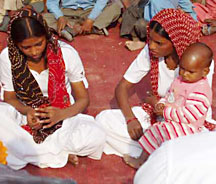 |
| Women from slum in North India gather to hear a gospel message. |
The trip took the group from New Delhi in North India to centrally located Hyderabad and the states of Tamil Nadu and Kerala in the south, where they met people still suffering from the effects of the tsunami.
Texas Baptists established a relationship with GFA in 2005 after the tsunami disaster. Texas Baptist Men worked with Believer’s Church pastors and volunteers, cooperating on relief efforts in South India and Sri Lanka.
Soon after arriving in New Delhi, the group visited an after-school program that GFA conducts in a desperately poor enclave of the capital near the airport. The “Bridge of Hope” program is duplicated throughout the country, teaching basic skills and literacy, providing toothpaste and soap, helping with homework and tutoring and teaching Bible lessons to poor children. Most of the children don’t know how to use toilets or cope with basic hygiene, the Americans were told.
There are 131 children in this particular school, and more than 25,000 enrolled across South Asia. Staff members also visit the 81 families whose children attend and involve them in what the children are learning. “About 65 percent of the parents are illiterate, and we plan to start a literacy program for them,” the school principal noted.
 |
| Childen in a slum area in North India. |
Despite the roar of jets just overhead, the children recited Bible verses for the guests. The American visitors noticed one older girl watching the proceedings from the roof of a building across the street. Other children peered into the courtyard from the street. Looking out on the children sitting in rows on mats, the principal appealed to the visitors, “Pray for these children and their parents.”
Driving a few blocks, then walking around the corner and over a ravine, the group visited a small Bible school where new believers are trained to be native missionaries. David Galvan, a pastor from Garland, was asked to speak to the students. He told them about the importance of the prayer of agreement from Acts 2:1. Since this was an English language school, no translator was needed, unlike other places the group visited. Students listened with rapt attention. One of the objects of learning in English, said the school’s director, is to be able to reach the English-speaking students and middle classes of New Delhi, a city of 13.8 million.
The trip north to North India included a visit to a church outpost located in a city slum. Charlie Singleton was asked to speak, as a crowd started to gather, curious about the visiting Americans. The people came out of their huts made of wooden scraps, canvas, tin and mud and heard his gospel message translated into Hindi. Although the foreign visitors were moving on, the church team stayed. One student lived in the slum with its residents day and night.
 |
| Terry Young (left) and Tom Law are greeted with flower garlands and a foot washing at the Girl’s Bible School in North India. |
The condition of the slum was the most striking aspect of the trip for Galvan.
“I have seen poverty in Mexico and in Latin America, but nothing compared to this,” he said. “It would seem that the children in the slums had not bathed in months. Their clothes and their hair appeared to be caked with dirt.”
Terry Young was also touched by the slum ministry.
“I have a picture that shows the little tiny church hut in the middle of the slum. At the end of the service, I saw John (the trip leader) begin to touch the little children’s hands. Those who are considered untouchable in their own country were so lovable to him. I was overcome.”
Later, David Fortenberry spoke to a group of children at a Bridge of Hope center in the same town. He told them the story of Jesus healing the daughter of Jairus.
“When I took the little girl by the hand–like Jesus did–and said, ‘little girl get up’ and she stood up with me, I felt connected to every child in that room,” Fortenberry said. “Later the teachers told me that the children had been greatly influenced by the story.”
The ugly fact of persecution kept intruding into the trip. On the train back to New Delhi a call came to the church coordinator for North India, giving the news that two students based in the very training center the group had just visited had been attacked and beaten in an outlying village.
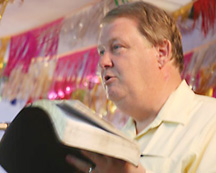 |
| David Fortenberry speaks at a church service in Tamil Nadu. |
Later the group learned the full story.
The men were attacked as they were showing the Man of Mercy film about Jesus. More than 200 villagers had gathered to watch the film in the courtyard of a believer’s home when a group of young militants attacked and started beating the missionaries. William, one of the missionaries, is the a pastor; and Eno, the other, works in film ministry.
Some of those watching the film tried to rescue the believers, but they, too, were beaten. The police came and took control of the situation, but as soon as they left, about 1,000 radicals surrounded the house, shouting anti-Christian slogans and threatening those inside. Miraculously, the owner prevented them from entering his property.
A brief check of Internet news stories from India found three or four acts of violence against Christians occur in India every month. For instance, in the weeks surrounding the group’s trip to India these incidents were reported:
–Feb. 4. A 15-year-old church member was killed in tribal violence in Assam State.
–Feb. 11. A native missionary was released after being kidnapped in the state of Chattisgarh in late January by a Marxist rebel group.
–Feb. 16. A crowd of 60,000 Hindus at a rally in the western state of Gujarat were urged to take up arms against Christians to stop what they called “forced conversions.”
–Feb. 22. A native missionary and several other Christians were jailed because of a radical anti-Christian plot to frame them for the murder of a child.
This climate helps explain a moving ceremony that native missionaries perform as they are sent to preach the gospel in a new village.
According to the group’s trip director, “when native missionaries go to the village they have chosen to reach with the gospel, they dig their own grave on the outskirts. This shows they are willing to give their own lives to reach those people,” he said. “One missionary responded to death threats with a question. ‘How can you kill a dead man?’ He knew he was crucified with Christ. That’s the passion that drives everything they do.”
The itinerary next took the American visitors to Hyderabad, a high-tech hub of India’s technology boom located in the south central plains of Andhra Pradesh state. A train ride south to an outlying town and then a grueling road trip of several hours in an SUV brought the team to a small dusty village. The event was the dedication of the 100th church building in Andhra Pradesh State. Church members and curious villagers mobbed the group, told them to get out of their vehicles, and then brought them, decked with flowers, into the village on ox carts in a procession with drums and singing. For a group with little resources, this was the only way to properly honor their guests. The Americans said they were at once awed and humbled by the almost biblical scene.
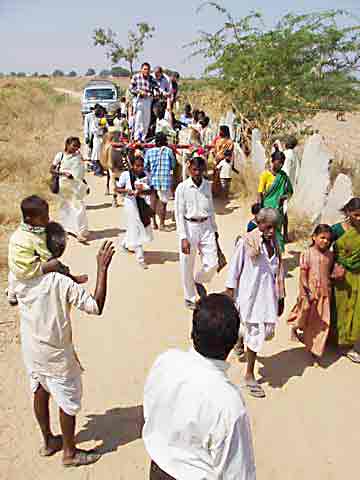 |
| Villagers in Andhra Pradesh bring the American team into the village on an ox cart. |
The church has 40 members in a village of about 1,500.
Just driving to the village impressed Don Jones with the immensity of the country and the vastness of the population. “We drove for 4 hours in the ‘country’ and saw no end to the people. That demonstrated the size and need,” he said.
Fortenberry found out that the village had an inadequate water supply. He is taking that need back to his church.
“Gabriel was the man who found that village and brought the gospel to it, and I asked him about the need of the village as a whole. They need water,” Fortenberry said. “So I am going to ask our church to help them by paying to have a ‘Jesus Well’ dug.”
After the ceremonies, the group met with a group of four young men who had been beaten by a mob a few weeks before in a nearby village. Madhu, spokeman for the group, said they had been holding meetings with about 50 children, similar to the Bridge of Hope ministry, for about a week in the village. One day, a gang of about 20 young men surrounded them and asked them what they were doing.
“‘You are trying to get these children to believe in the American god,’ they said. We said, ‘You don’t know anything about Jesus. How can you be rebuking us?’ Then they saw that we had a stack of New Testaments in our room, and they started beating us. ‘If you don’t leave, we will kill you,’ they said.”
The gang left, but returned later, burned all their literature and beat the missionaries again. But this incident had a remarkable resolution. A police officer learned about the beatings and rounded up the young men. The missionaries didn’t want to press charges. “We want to forgive them,” they said. Then the parents of the children went to the police and said they wanted the missionaries to continue their work in the village, even though they knew they would talk about Jesus to their children. The gang was told not to bother the missionaries again, and to pay back the damages for the burned literature.
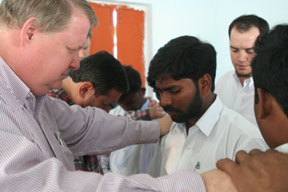 |
| David Fortenberry prays for a group of native missionaries who were beaten when teaching an afterschool program for children in a village in Andra Pradesh. |
Nathan Tucker, a pastor from Southlake, asked Madhu why they would want to return to a village where they had been so badly treated? “We believe Jesus will change their hearts,” Madhu replied.
Other incidents haven’t had such a happy ending. Two pastors were murdered last year in Hyderabad, according to church coordinator for central India. One body was found on the outskirts of the city in a plastic bag “after passersby reported a bad smell.” The killer was apprehended and was found to be a member of a militant Hindu nationalist group.
Another day of travel by plane and bus brought the Americans to Tamil Nadu State and the scene of tsunami devastation in a coastal town at the tip of India. The fishing fleet there was destroyed, and GFA, as well as other groups, have been working to replace the boats used by the fishermen. Even so, the church still has to help out many in its congregation –and many neighbors, too–by distributing bags of rice every week.
A man receiving a bag of rice at the church said he was still living under palm fronds on the beach after his home was destroyed. About 50 small houses are being built by GFA in order to relieve those who lost homes to the wave. One child attracted to the visiting foreigners on the beach indicated with hand motions how he had to swim for his life when the wave struck.
 |
| Gospel for Asia is helping replace fishing boats destroyed by the tsunami in a coastal town at the southern tip of India. |
At enthusiastic worship services that often lasted several hours, the visiting group witnessed a devotion that humbled them.
“It made me look at my commitment to the ministry God has given me to do and my willingness to sacrifice,” Singleton said. “We as Americans take missions and ministry for granted. Even in the worship services the people were willing to kneel longer then we are willing to sit on cushioned pews.”
The last destination of the group’s visit was the seminary located in Kerala, a lush land of palm trees in South India where an occasional elephant can be seen walking down the street. This is the mission group’s nerve center and headquarters. Its western-style buildings and 150,000-volume library serve a student body of about 600 and offers bachelors and advanced degrees. A church where the Apostle Thomas preached in A.D. 52, according to legend, is only about five miles away. This is a stronghold of Christianity in India, although its Christian population is still only about 30 percent of the total.
Although the seminary provides modern dormitories, the students go to classes in thatched-roof huts similar to what they will experience in the field.
Singleton remarked: “That’s the problem so often with (American) seminary. Students come out expecting to go to a big 3,000-member congregation. They forget that most churches are small churches.”
At the seminary, the group met with K. P. Yohannan, the founder and president of Gospel for Asia. He commutes frequently between GFA’s Carrollton headquarters and India. He’s the author of 200 books and he conducts a radio ministry in a conversational style that is translated and broadcast all over Asia. The ministry receives thousands of letters each week in response. Yohannan started out, like all the native missionaries he now leads, by preaching in the streets and villages. He went to Rajasthan in western India to preach the gospel and was beaten so badly he was put in the hospital. He kept ministering like that for eight years.
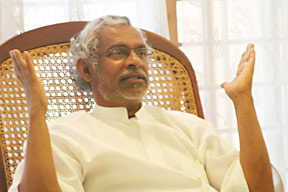 |
| Gospel for Asia founder K. P. Yohannan. |
He has a Texas connection from his student days at Criswell College in Dallas. W. A. Criswell invited him to attend the school in 1974 as its first international student. “I’m an ordained Southern Baptist,” he said. But Yohannan’s message seems to run counter to the direction of modern American Christian culture. And he doesn’t mince his words.
“You can’t have authentic Christianity without suffering,” he said. The native missionaries that we send out “get a one-way ticket to missions. These guys going into Nepal, for instance, say goodbye to their families as if it were the last time they will see them. They know they might never come back. Each time they return there is a celebration.”
In the United States, he said, “people are told that if they just praise the Lord and speak in tongues, their service is over. There is no sacrifice.”
Looking at historical missions strategy, Yohannan said modern mission movements are still making the mistakes of the past. “Ninety percent of mission resources still go to meet physical needs rather than spiritual needs,” he noted.
But Yohannan is known for changing an opinion or tradition if it doesn’t work, and that’s what happened when he confronted the most exciting development for the gospel in India –an awakening among the Dalits, the untouchable caste numbering 300 million. A few years ago Dalit leaders started encouraging their people to break with Hinduism and convert to Buddhism, Christianity or some other religion that would free them from their low-caste status.
“I had been vehement against the social gospel in my previous books and teaching,” he said. “But the Dalits said ‘Please come and help our children.'”
Yohannan resisted, he said, until one night he had a vivid dream.
 |
| Children at a Bridge of Hope center in a coastal town in Tamil Nadu are served a meal. |
“I saw myself running toward a field ripe for harvest, but a river separated me from it. Suddenly a bridge appeared over the river, with children on the bridge.”
Thus began the ministry known as Bridge of Hope–teaching literacy and providing for physical needs of poor children.
“Our staff was asking ‘how are we going to explain this to our people?’ I don’t care what people think about me. I only care what God thinks.”
“There are 162 million child laborers in India,” Yohannan said, mostly Dalits. “Kids chained to steel posts working in carpet factories. Many 6 to 8 years old earning 10 cents a day. I believe that God will free a million of these children through the Bridge of Hope program.”
Yohannan said he is dismayed by the “speak it and claim it” style of Christianity so popular in America. “Why are their lives so shallow? The answer is not to talk about the need for mission work. The answer is to walk away from plastic phoniness and come to know the Lord.”
The single most hurtful thing for evangelistic work in India comes from some foreign T.V. evangelists coming to India without understanding and spoiling longterm groundwork that has been laid by ongoing ministries like GFA.
“What they do is a performance. They speak in tongues and then fall down. This is nothing new. It confuses our people. We have to teach them the difference.”
 |
| Children at the Bridge of Hope center in a poor enclave in New Delhi. |
“When you have people from a Hindu background and they see this, they don’t know what to think.”
Yohannan said he sees himself as a servant to the native missionaries he’s sending out. “But most of them don’t have clothes or even a bicycle.”
“I realized we had plenty of workers, but there were no resources. The income average in India is $210 a year.”
GFA’s purpose is to coordinate support from Christians in the west for native missionaries. As little as $30 a month will help support a native missionary for a month.
But Yohannan also realized they would have to start churches, “not just throw people away who came to Christ.” So to better train the native missionaries, he needed a seminary.
“We needed our people to train others for the field. The result is that GFA’s seminary is the largest training group in the 10/40 window.”
(The 10/40 Window is an area with the largest population of non-Christians in the world, extending from 10 degrees to 40 degrees north of the equator, and stretching from North Africa to China).
“But we can never catch up to the harvest that’s needed,” Yohannan said. So another barrier had to come down. “We are planning to help other denominations to see how we do things, and branch out and multiply that reach.” Other denominations are encouraged to use the seminary facilities and library.
 |
| Man in Tamil Nadu cuts open a coconut for American visitors. |
Nathan Tucker asked Yohannan how these methods might be transferred to mission work in other places –in South America or even in Texas.
In the final analysis, Yohannan said, God’s work is not done in mission committees and printouts. “It’s as God calls individuals. I made a decision to preach the gospel where Christ’s name was not known. You need to do what God tells you.”
He said Baptists can support native missionaries one church at a time, without hurting the established missions programs. “I think if that happens in 5,000 or 6,000 churches we could be a blessing both there and here. It could bring about a whole revolution in missions.”
Although Yohannan sees much that is lacking in modern western Christianity, “America is still the flagship church in the world,” he said. “It still has a significant role to play.” The response of Texas Baptist Men after the tsunami especially impressed him. “I’m amazed by their hard work and commitment.”
“If we can get more American churches praying for the lost peoples of the world, we’ll get God’s blessing.”
Related links: Gospel for Asia.
News of religion, faith, missions, Bible study and Christian ministry among Texas Baptist churches, in the BGCT, the Southern Baptist Convention ( SBC ) and around the world.

















